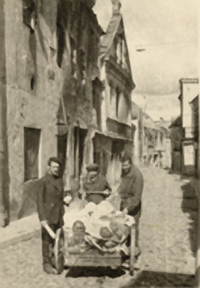SHMERKE KACZERGINSKI
 |
Sutzkever and
Kaczerginski collecting materials after Vilna was liberated.
ID: RG 223 – 710.24a. From the photographic archive of YIVO
Institute for Jewish Research, New York. |
Shmerke
(Pol., Szmerke) Kaczerginski (1908–1954), Yiddish
writer and cultural activist. Born in Vilna to a poor family and educated
at that city’s Talmud Torah, Shmerke Kaczerginski lost both his
parents during World War I. As a youth, he was involved with outlawed
Communist groups and was arrested several times, serving a lengthy prison
term. In the 1930s, two of his revolutionary poems became popular in
Poland. He wrote short stories with a radical bent and was a correspondent
and reporter for literary publications, including the semi-legal leftist
press in Poland and the New York Communist daily Morgn-frayhayt.
Kaczerginski played a key role in shaping the writers’ and artists’
group Yung-Vilne; he organized its evening events and was the de facto
publisher of its three miscellanies between 1934 and 1936. During the
period of Soviet control over Lithuania in 1940–1941, he was even
more active in the field of Yiddish culture, but at the same time experienced
his first disappointments with the attitude of the Soviet regime
toward Jewish culture. During the first period of Nazi occupation, Kaczerginski
wandered through villages and towns posing as a deaf mute; after many
difficulties, he ended up in the Vilna ghetto.
Kaczerginski was very involved in the ghetto’s cultural activities.
As a leader of its youth club, he wrote its Yugnt-himen (Youth Hymn),
a song that immediately became popular. In 1943, he wrote the song Shtiler,
Shtiler in memory of the mass murders committed at Ponar. Set to
music that Aleksander Volkoviski (later known as Aleksander
Tamir) had submitted to a contest organized by the ghetto,
the song was first heard at an evening performance there and over the
years became one of the best-known songs of the Holocaust.
With Avrom Sutzkever and others, Kaczerginski became part of a group
of forced laborers whom the Germans designated to sort Jewish cultural
treasures at YIVO and other locations. Known as the Papir-brigade (Paper
Brigade), the group’s members risked their lives to hide the most
significant items, smuggling them back into the ghetto or entrusting
them to non-Jewish acquaintances.
Kaczerginski was a member of the Fareynikte Partizaner Organizatsye
(United Partisans Organization; FPO), and, since YIVO’s building
was located outside the ghetto walls, he took part in smuggling weapons
into the ghetto.
In September 1943, Kaczerginski, along with Avrom and Freydke Sutzkever
and other members of the FPO, escaped from the Vilna ghetto as part
of an organized group of fighters just before its liquidation. They
joined a Soviet partisan unit in the Naroch Forests, where Kaczerginski
fought as a partisan until liberation in July 1944. Kaczerginski’s
books describe the destruction of Vilna, the partisan struggle, and
his own experiences during the Holocaust period: Khurbn Vilne (The
Destruction of Vilna; 1947), Partizaner geyen (Partisans on
the Move; 1947), and Ikh bin geven a partizan (I Was a Partisan;
1952).
After liberation, Kaczerginski returned to Vilna, where he was involved
in attempting to rebuild a Jewish life, in locating the Jewish cultural
treasures that had been saved, and in founding a Jewish museum in the
city. However, the museum staff quickly realized its future was uncertain
under the Soviet regime, so they strove to smuggle the most important
materials out of the country. The portion of the rescued documents
that ended up at YIVO in New York became the Sutzkever-Kaczerginski
Collection, which includes the diaries of Zelig Kalmanovitch and Herman
Kruk, other documents from the ghetto and the Holocaust period, and
also a portion of YIVO’s prewar collection.
In 1946, Kaczerginski left for Poland, settling temporarily in Lódz´
where he was a contributor and editor of the organ of Po‘ale
Tsiyon. He collected Holocaust folklore materials, particularly songs,
and out of that work grew the collections Dos gezang fun vilner
geto (The Song of the Vilna Ghetto; 1947) and Lider fun di
getos un lagern (Songs of the Ghettos and Camps; 1948)
From Lódz´, Kaczerginski left for Paris and in 1950 settled
in Argentina, where he instantly became very prominent in Jewish cultural
circles as an editor and speaker. His sudden death in an airplane crash
in 1954 elicited great sadness, and a year later a memorial volume was
published that included tributes to his life and some of his unpublished
manuscripts.
Source:
YIVO Institute of Jewish Research, New York
Novershtern, Avraham. "Kaczerginski, Shmerke." YIVO Encyclopedia
of Jews in Eastern Europe 17 August 2010. 20 December 2011
(Novershtern, Avraham - Professor of Yiddish Literature, Hebrew University
of Jerusalem)
For
complete article and further resources visit: http://www.yivoencyclopedia.org/article.aspx/Kaczerginski_Shmerke
For further
information:
United States
Holocaust Memorial Museum Washington
Yad Vashem
The Holocaust Martyrs' and Heroes' Remembrance Authority
Wikipedia





